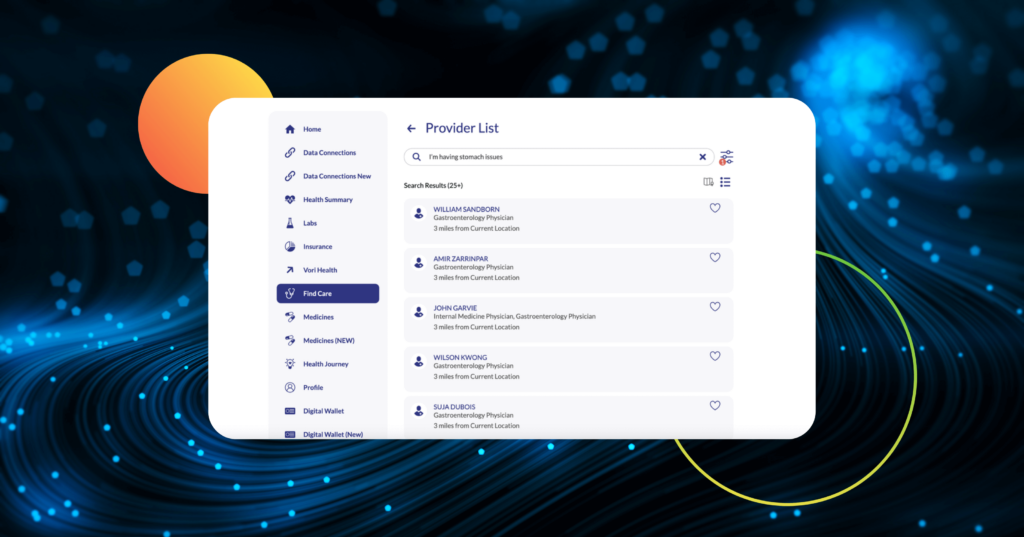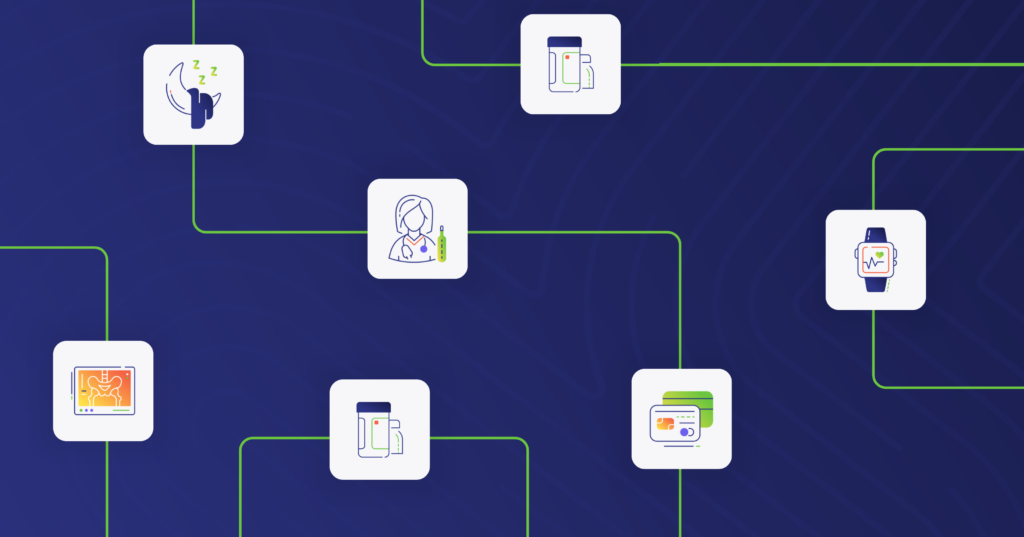The quest for personalized healthcare and precision health stands at the forefront of innovation and consumer engagement. This was a key topic of discussion during the ATA Nexus conference in Phoenix, Arizona this year. Across conference sessions and panels, attendees shared insights and their strategies for driving outcomes by bridging the gaps between care delivery and meeting consumer expectations.
One panel titled, “Towards Precision Health: Navigating the Path to Personalized Care,” aimed to address this very topic. As moderator, Kristen Valdes, Founder and CEO of b.well, kicked off a captivating dialogue challenging the status quo of episodic care. With a compelling call to action, she urges the audience to rethink healthcare delivery, emphasizing the necessity of meeting individuals where they are, rather than where traditional models dictate.
Panelists Seth Staton, Head of Clinical Programs and Innovation at Walgreens, and Ricky Choi, Head of Digital Health at Samsung, shared insights into their organizations’ roles in advancing precision healthcare and leveraging data-driven insights and behavioral science to tailor healthcare experiences.
If you missed the session, don’t worry—we’ve got you covered. This article summarizes the key points and takeaways from the hour-long discussion, offering expert insights on unlocking personalized healthcare.
Dive in to discover what you need to know, or jump to these key points:
- Tapping into the Power of Loyalty Programs
- Navigating Data Integration and Personalized Healthcare
- Connecting the Ecosystem for Holistic, Unified Care
- Balancing Personalized Healthcare and Privacy
- Empowering Value-Based Care through Personalization
- Disrupting Healthcare: Friend or Foe?
- The Future of Interconnected Devices in Healthcare
- A Call for Collaboration and Innovation
Tapping into the Power of Loyalty Programs
Valdes steers the discussion towards the integration of loyalty programs as part of care delivery, highlighting the inherent human inclination towards incentives and rewards to drive engagement and behavior change.
Staton agrees that there is transformative potential of loyalty programs in healthcare but only through strategic partnerships and enriched data to help identify the types of rewards that will drive customer action. He highlighted that Walgreens aims to enhance patient experiences and promote adherence to care plans by leveraging various reward programs that resonate to consumers at the individual level. Seth’s insights shed light on the evolving role of loyalty programs as catalysts for personalized healthcare interventions.
Navigating Data Integration and Personalized Healthcare
The conversation dives deeper into the intersection of data enrichment and personalization in healthcare. Valdes highlights the transformative impact of recent legislative changes, empowering consumers to access and share their health data seamlessly across platforms and systems of care. Through open APIs and interoperable systems, individuals gain unprecedented control over their health information, paving the way for personalized interventions and enhanced care coordination. It also empowers them to understand what their data means and how to consent to sharing it with their providers and plans.
Staton and Choi elaborate on their organizations’ efforts to harness data insights for personalized healthcare delivery. From medication reminders to real-time health monitoring, both Walgreens and Samsung are at the forefront of leveraging data to drive actionable insights and empower individuals in managing their health. Their commitment to privacy and security spotlights the ethical considerations inherent in data-driven healthcare initiatives.
Connecting the Ecosystem for Holistic, Unified Care
As the discussion unfolds, the panelists dive into the concept of ecosystems in healthcare delivery, emphasizing the importance of collaboration and partnership. Staton highlights the pivotal role of ecosystem integration in expanding access to care and driving innovation. By forging strategic alliances with complementary partners, Walgreens and Samsung Health aim to create a seamless healthcare experience.
Balancing Personalized Healthcare and Privacy
In addressing concerns about data privacy and personalization, the panelists emphasize the importance of transparency and consent. Choi articulated Samsung’s commitment to privacy and security, highlighting the company’s adherence to stringent protocols and processes. By prioritizing consumer trust and value, Samsung aims to strike a balance between personalization and privacy in healthcare.
Valdes dives into personalization nuances, raising questions about the frequency of nudges and reminders in healthcare interventions. Staton emphasizes behavioral science’s role in understanding user preferences and optimizing engagement strategies. By tailoring interventions to individual needs and goals, healthcare providers can deliver value-added services without overwhelming users with information.
Empowering Value-Based Care through Personalization
As the dialogue progresses, the focus shifts towards the intersection of personalization and value-based care. There is untapped potential of personalization in driving value-based care adoption, citing examples of proactive outreach and targeted interventions tailored to individual needs. Staton highlights Walgreens’ commitment to leveraging data insights to optimize resource allocation and enhance patient outcomes within value-based care models.
Choi reflects on Samsung’s role in facilitating value-based care initiatives through technological innovation and ecosystem integration. He emphasizes the importance of capturing value through outcomes-driven approaches and collaborative partnerships within the healthcare ecosystem. He stresses the need for aligning incentives and fostering a culture of innovation to drive sustainable improvements in healthcare delivery.
Disrupting Healthcare: Friend or Foe?
The panelists reflect on the role of disruptive innovation in healthcare and the nuanced relationship between industry players. Staton navigates the complexities of disruption, highlighting Walgreens’ dual role as both a longstanding healthcare provider and a catalyst for transformative change. He emphasizes the importance of collaboration and value-based arrangements in driving positive outcomes for patients and stakeholders across the healthcare continuum.
Valdes aligns with Staton, recognizing healthcare disruption’s complexity. She stresses dialogue and collaboration among stakeholders, emphasizing perspective in assessing impact and the potential for mutual benefit through cooperative competition.
The Future of Interconnected Devices in Healthcare
As the discussion draws to a close, the conversation briefly touches upon the interconnectedness of smart devices and their potential impact on healthcare delivery. Staton addresses a pertinent question about the compatibility of various smart devices and the potential for a more cohesive experience across different platforms. He acknowledges the competitive landscape but emphasizes the importance of evolving towards models that prioritize interoperability and seamless integration.
Choi highlights Samsung’s SmartThings IoT platform as an example of a business model that focuses on the services layer rather than device-specific compatibility. This approach aims to create a more cohesive and interconnected ecosystem, allowing for a seamless experience across a diverse range of devices and software.
A Call for Collaboration and Innovation
As we navigate the complexities of modern healthcare, fostering collaboration, innovation, and a shared commitment to improving health outcomes remains paramount. Together, we can unlock the full potential of personalized healthcare, forging a brighter, healthier future for all.
At b.well Connected Health, our partnerships align with this vision. Integrating with Samsung Health, we empower users with control over their longitudinal health records, proactive insights, and easy access to care from an expanding network of providers, including Walgreens. These collaborations aim to provide consumers timely access to care while promoting greater engagement with their health. By uniting efforts, we can effectively pursue our shared goals, paving the way for a happier and healthier future in healthcare.



